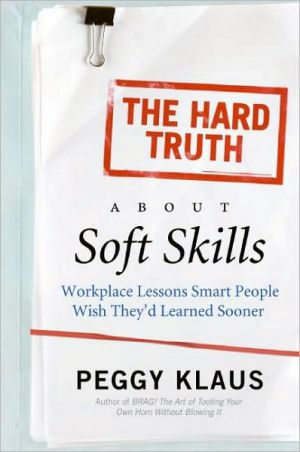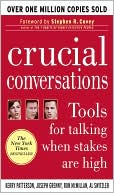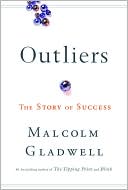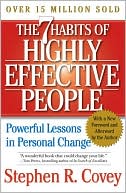Hard Truth about Soft Skills: WorkPlace Lessons Smart People Wish They'd Learned Sooner
What's the hard truth? Soft skills get little respect but will make or break your career. Master your soft skills and really get ahead at work!\ \ Fortune 500 coach Peggy Klaus encounters individuals every day who excel at their jobs but aren't getting where they want to go. It's rarely a shortfall in technical expertise that limits their careers, but rather a shortcoming in their social, communication, and self-management behaviors. In The Hard Truth About Soft Skills Klaus delivers...
Search in google:
What's the hard truth? Soft skills get little respect but will make or break your career. Master your soft skills and really get ahead at work! Fortune 500 coach Peggy Klaus encounters individuals every day who excel at their jobs but aren't getting where they want to go. It's rarely a shortfall in technical expertise that limits their careers, but rather a shortcoming in their social, communication, and self-management behaviors. In The Hard Truth About Soft Skills Klaus delivers practical tools and techniques for mastering soft skills across the career spectrum. She shows how to: manage your workload handle the critics develop and promote your personal brand navigate office politics lead the troops and much more! Klaus reveals why soft skills are often ignored, while bringing their importance to life in her trademark style—straightforward, humorous, and motivating. Perfect for readers at all professional stages—from those who are just starting out to seasoned executives—this book is essential reading for anyone who wants to take his or her career to the next level. Atlanta Journal-Constitution “This is a good book to read with a notebook at your side, in case you spot anything you’ve been doing to hold yourself back in the workplace.”
The Hard Truth About Soft Skills\ Workplace Lessons Smart People Wish They'd Learned Sooner \ Chapter One\ Control yourself\ \ Knowing yourself is as important as knowing how to do the job.\ There's no such thing as work-life balance, only trade-offs.\ Years of loyalty can work against you.\ Listen to your gut—it's full of data.\ No risks, no rewards.\ Get out of your own way.\ Learn the honest truth about integrity.\ You have to be good to be lucky.\ \ A few years ago, an HR executive at a Fortune 500 company said to me, "Peggy, I can't believe how many people believe their bosses wake up in the morning thinking, 'Gee, let's see what I can do for you today.'" Her point was this: Chances are, nobody will ever care about your career more than you do—except for, well, maybe your parents or spouse. This means you must take responsibility for managing your own career—don't even think about leaving it to anyone else. I'm not saying that those around you at work aren't interested in helping you succeed. But their focus is mainly on themselves—their own projects, trajectory, and careers.\ And similarly, your focus should remain squarely on you. Even when you don't work for yourself, managing your own career means wearing the many hats of an entrepreneur. Start thinking like the CEO, marketing manager, sales force, HR director, head of product design, and talent coordinator of your own company—a company of one, which is you.\ Why is it so important that you take the reins when it comes to career management? First, gone are the days ofjob security. Mergers, acquisitions, downsizing, and international competition have done away with that. The average working American will now have between ten and twelve jobs and three to five careers during his or her lifetime. Second, people across the board—including your boss, his or her boss, and the HR director—are being asked to juggle more and more assignments, often combining the responsibilities of two or three people into one job. Most of the folks you assume are thinking about your career simply don't have the time or the energy, and you certainly can't expect them to be psychic when it comes to knowing what you want for your future. Third, those who let their careers "just happen" or expect employers to orchestrate them will end up disappointed. Unfortunately, most graduates are completely unprepared for their first encounter with these harsh realities—especially given that some of them have grown accustomed to e-mailing their college papers home for their parents to edit!\ Whether just starting out or well on your way, one of the most important things you can do is take responsibility for yourself—your career, your goals, and your own behavior. Doing so begins with a very healthy dose of self-awareness and a commitment to self-management. Indeed, both are at the foundation of soft skills mastery—you'll see them time and time again throughout the rest of the book. In the lessons presented in this chapter, you'll find a variety of soft skills at play, including engaging in self-assessment on a continual basis, being personally accountable, creating a work life that makes sense, taking risks, listening to your intuition, and attracting luck. I'll also touch upon another soft skills area that will never go out of style: old-fashioned honesty and integrity.\ \ Knowing yourself is as important as knowing how to do the job.\ \ "Climb every mountain / Ford every stream / Follow every rainbow / Till you find your dream." Sound familiar? Sometimes when attending professional conferences, I feel like I am in a never-ending stage production of The Sound of Music. Motivational speakers shout from on high, "Follow your passion! If you think it, you will achieve it." I swear, if I hear one more person say something like that, I'm going off a Swiss alp. Which is probably why I relate so well to people who tell me how they wish they'd realized sooner that being passionate about something doesn't automatically mean you'll have the talent or aptitude to be successful at it. And even having all three—passion, talent, and aptitude—still doesn't guarantee success. One way of finding your bliss, your life's work, or simply something you won't mind spending eight to ten hours doing each day is to get to know yourself really, really well.\ From my front-row seat, there's nothing soft about taking a hard look at who you are. After more than a decade of coaching people on all rungs of the career ladder, I find time and time again that the ones who have never taken an inventory of themselves wind up doing things that they aren't successful at or are miserable doing. They haven't thought enough about what kinds of tasks they like and dislike, which talents and interests they want to incorporate into their work life, or how their strengths and weaknesses might impact career choices. It's pretty simple, actually. Each of us has special gifts that are better suited to certain kinds of careers than others. If you seek out a line of work that's a good match, you'll more likely flourish. If you pursue an incompatible line of work, you'll more likely struggle. In order to learn where you'll thrive the most, take the time to get to know yourself better. Think of it as buying a special type of insurance that will make you less vulnerable to heartaches, anxiety, stress, and losing time or money. That said, knowing what you are best suited doing workwise can be tricky. It's not always clear where your strengths lie from the start, so it can take some time and experience to figure it out. And sometimes we can learn the most from paying attention to our weaknesses. This was the case for thirty-eight-year-old Marta.\ In the early years of her career, Marta changed jobs so often that it started to raise eyebrows and make potential employers think she was uncommitted, flighty, or someone who bored easily. In fact . . .\ The Hard Truth About Soft Skills\ Workplace Lessons Smart People Wish They'd Learned Sooner. Copyright © by Peggy Klaus. Reprinted by permission of HarperCollins Publishers, Inc. All rights reserved. Available now wherever books are sold.
Introduction: The Hard Truth About Soft Skills 1Control Yourself 7Knowing yourself is as important as knowing how to do the jobThere's no such thing as work-life balance, only trade-offsYears of loyalty can work against youListen to your gut-it's full of dataNo risks, no rewardsGet out of your own wayLearn the honest truth about integrityYou have to be good to be luckyGetting the Job Done 31Your boss wants you to figure it outLearn when to stick and when to shift or the details will hang youWhen you can't deliver, don't say yes... but be careful how you say noYour procrastination is trying to tell you somethingWhining is for kids... and even then, no one wants to hear itManage your meetings... or elseCommon sense is far too uncommonWhen you Open Your Mouth... and Then Some 51Listening is part art, part science, and all importantAdjust your communication accordinglySay the magic words: please, thank you, and I'm sorryKeep your mouth shutGet smart about asking dumb questionsLearn how to present without needing betablockersHandling your Critics 69Books are judged by their covers and the same is true for youDon't be the last one to find out how you're doingNever tolerate a bully boss-even if you have to quitYou don't need to be everyone's best friend-that's what dogs are forYour greatest tormentor might prove to be your greatest teacherKnow where to draw the line between self-improvement and self-destructionStay cool in the hotseatWhat, me Political? 91Learn the unspoken rules of your workplaceTwo heads are better than one, so find a mentorDon't let the fear of "sucking up" hold you backWhen it comes to gossip, learn the art of deflectionThink long and hard about going over your boss's headManage your affairs: kiss with caution!Branding and Bragging 109Think of yourself as a cereal brandTurn your accomplishments into a storyTooting your own horn isn't just for performance reviewsYou're only as good as your last movie, so keep your brags freshPut the right words in their mouthsKeep your visibility when you're not face-to-faceStop credit thieves in their tracksHot Buttons: Gender, Generation, and Culture 131Don't take it personallyRaise your sensitivity antennaCompetition is a double-edged swordFind the silver liningStop stereotypes from sinking youLeading the Troops 151Know what you're getting intoA good manager knows when to leadAvoid being a know-it-all, say-it-all, control-it-all kind of bossPeople aren't mind readersYou're the boss, stupid, that's why they hang on your every wordTreat everyone equallyThe impostor syndrome will follow you up the ladderA little humility takes you a long wayAfterword: Don't Skip your Soft Skills 175Acknowledgments 181Index 183
\ Booklist"The authors offer 54 important workplace lessons...[and]...offers important insight for careermanagement which will be helpful to a wide range of library patrons."\ \ \ \ \ Atlanta Journal-Constitution"This is a good book to read with a notebook at your side, in case you spot anything you’ve been doing to hold yourself back in the workplace."\ \ \ Atlanta Journal-Constitution“This is a good book to read with a notebook at your side, in case you spot anything you’ve been doing to hold yourself back in the workplace.”\ \ \ \ \ Booklist“The authors offer 54 important workplace lessons...[and]...offers important insight for careermanagement which will be helpful to a wide range of library patrons.”\ \








